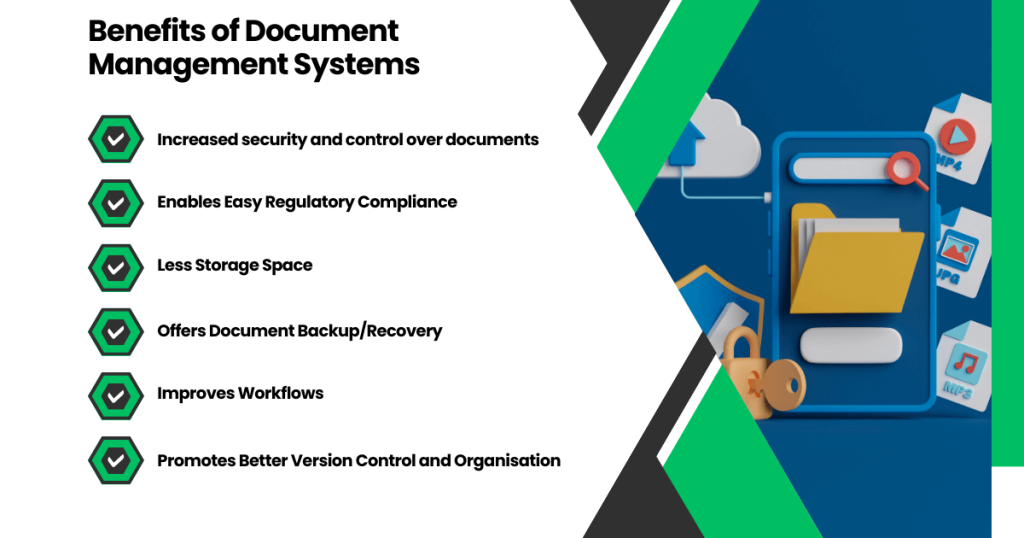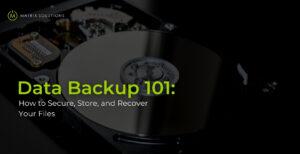The growing business firm’s quest for a fast and reliable digital infrastructure is visible, but why? Why are firms desperately shifting towards digitised storage? And why use a document management system? What does document management do? How can it help businesses improve?
Document management is a major part of any business’s smooth processing in the modern corporate context. Any required information needs to be stored safely and also swiftly retrieved for unhindered business operation. As a solution, a document management system (DMS) provides a private platform for storing, organising, and retrieving documents at the utmost convenience.
What is a Document Management System?
A document management system is a computer software solution that manages files and documents. It’s like a digital file shelf where you can store, share, and track your data at any time you want.
The information is stored in a digital repository, sometimes even in a physical infrastructure. The storage is ensured by top-level cybersecurity and a backup plan, allowing robust security of the stored data. Some of these systems can keep track of changes made to documents by different users and record the different versions created.
Why is a Document Management System important?
Technological advancements massively impact any business’s smooth functioning today. Digitisation has proven its magnificent worth in such a short period of time that the trend of businesses switching to a digital approach is ever-increasing.
According to Seagate’s Rethink Data report, today, approximately 30% of data storage takes place in internal data centres, 20% in third-party data centres and 19% at the edge. Data storage also takes place in cloud repositories or other locations, representing another 30%.
Sound and safe document management will not only enhance business operations but also ensure the data’s security. You will be able to swiftly record and fetch any information at any given time.
A document management system allows the recorded data to be kept safe from any cyber breach attempts and stored with a backup plan, meaning that you can still recover the data despite data being erased unintentionally.
Therefore, a document management system is important because it improves your business productivity by streamlining information and keeping it secure.
Benefits and Advantages of Document Management Systems
Less Storage Space
Document management software is based on a digital storehouse. This approach is contrary to the traditional practice of storing papers on one shelf or even a building. These traditional methods usually would account for a hefty expense and yet still weren’t as safe and convenient as digital storage.
This is one great answer to the question of why use a document management system. Document management benefits may be numerous, but nothing beats the idea of getting rid of unnecessary expenses on storing files.
Offers Document Backup/Recovery
Losing your data and never being able to recover it is as harmful as it is hurtful. Some records may be crucial for future purposes, and the vanishing of such important information might have severe consequences.
It is not a scary hypothesis either; it has happened to many big firms before. A strong document management system advantage is that it stores your documents in backup deposits so that you won’t lose your information even if your normal system collapses.
Improves Workflows
Physically walking around the office to retrieve or store data can be a time-consuming task, and locating a particular file from a large collection can require extra effort from in-house officers, who may already have other duties to fulfil. This conventional approach to document management can have a negative impact on business productivity, as it often demands significant time and effort or even additional human resources.
One of the major advantages of electronic document management systems is that it massively impacts an organisation’s workflow. The easy and convenient access to documents allows employees to swiftly store or retrieve data.
Promotes Better Version Control and Organisation
Document management systems enhance version control and management. It allows the business firm to keep the old forms of documents, especially technical ones like blueprints, schematics, and process flow diagrams, whenever the files or document formats are changed.
Business firms can also track and manage changes made by many users simultaneously. It helps in retrieving specific versions of a document from its history whenever necessary. Using version control in digital document management is a popular and efficient way to handle changes and keep track of different versions.
Promotes Better Version Control and Organisation
Document management systems enhance version control and management. It allows the business firm to keep the old forms of documents, especially technical ones like blueprints, schematics, and process flow diagrams, whenever the files or document formats are changed.
Business firms can also track and manage changes made by many users simultaneously. It helps in retrieving specific versions of a document from its history whenever necessary. Using version control in digital document management is a popular and efficient way to handle changes and keep track of different versions.
Enables Easy Regulatory Compliance
Complying with government regulations requires an effective document management system. Document management software can limit data access and automate processes to maintain consistency and minimise the risk of non-compliance.
So before asking yourself why you use a document management system, you should be aware that compliance is something that you must be updated and adapt to. Such compliance with regulatory compliance is best managed and sorted with a firm document management system. Document management software provides data protection, automates processes, enables auditing functions, and controls workflows, making it an essential tool for complying with government regulations.

Grants Wider Access to Documents
It can be difficult to manage physical documents since they can only be in one place at a time, and copying them is not always safe or efficient. But if you use a document management system, people can access the documents they need without waiting for others to finish with them.
Team members can access these documents from different devices like desktops, laptops, and mobile devices, ensuring that everyone who needs access can get it.
Increased security and control over documents
Managed services provide excellent cybersecurity solutions that protect valuable client information and defend businesses against cyber threats. They also offer better control over documents and data stored in the system, which also reduces potential risks.
It provides a secure environment as only authorised users are allowed to access specific information, and we carefully monitor every other changes to minimise risks.
Robust security measures such as authentication, access control, and encryption control are implemented to prevent sensitive information from being misused accidentally or intentionally.
Saves Time and Money
Any business firm that uses computerised software or tools needs professional IT help to manage and troubleshoot its technological systems. Matrix Solutions’ Managed IT services provide a solution by assigning experienced technicians who can handle such problems. You can benefit from our top-notch professionals without having to pay full-time salaries and benefits with managed IT services. You can choose the level of service you need and only pay for specific services required, avoiding unnecessary expenses.
By utilising managed IT services, your business can operate more smoothly and efficiently, saving you valuable time and money.
Which Document Management System to Choose?
There are numerous document systems that have been delivering productive results for businesses across the world so far. Let’s look into the prominent ones:
Popular Document Management Systems
NetDocuments
NetDocuments is one of the most popular document management systems. The secure and reliable cloud-based document management system (DMS) enables you to store, find, share, automate, and collaborate on documents easily from any device and from anywhere.
LogicalDOC
LogicalDOC is another famous web-based application for managing documents that operates through a web browser. The application is compatible with a variety of popular web browsers, including Firefox, Internet Explorer, Safari, and Google Chrome. The web interface is built using the Google Web Toolkit.
SharePoint
SharePoint is a web-based platform that integrates with Microsoft 365. Launched in 2001, it primarily serves as a document management and storage system, but its usage varies among organisations.
OpenText eDocs
OpenText Document Management, eDOCS Edition (eDOCS DM) is a secure and centralised storage software that handles content related to specific cases. You can change it to fit your firm’s needs.
eFileCabinet
eFileCabinet is a company based in Lehi, Utah, offering document management software as a service (SaaS) for managing and storing documents, content, and records on-site or in the cloud.
Factors to Consider when Choosing a Document Management System
Implementing document management software has been an impactful change for numerous businesses from various industries. But the implementation process may be complicated and also need some careful consideration as the following:
User-friendliness
Document management software is used by all employees from all backgrounds. A business intending to incorporate technology into business should be aware of this and ensure that the new implementation should be easy to access for all of its employees.
Aligns with Business Goals
There are various different types of document management software that serve varied purposes. Buy document management software that is able to deal with your business style, needs and requirements.
Security and compliance
Acquiring a document management system will mean you will be sharing almost all of your info and data on a digital platform. The digital platform would also be run by an external company. So it is very important for firms to ensure that their service provider has a sound record of cybersecurity and compliance with government regulations.
Seamless Adaptation
The transition of shifting to a digital platform will bring a lot of miscommunications. A lot of things may get lost in translation, and the organisation’s employees, especially those with little prior technical experience, might find it difficult while adapting to it.
Pricing
Document management software is available in different forms designed for different business industries and sizes. It is crucial to understand which document management software precisely fits your organisation. You should know how much the whole cost would amount to and only opt for services that are under your budget.
Why Cloud-Based Electronic Document Management Software?
An electronic document management system has the capacity to massively impact your business. This digitised approach reduces costs that occur with traditional paper-based solutions.
Cloud-based electronic document management software reduces the cost, time and energy required to store and retrieve data through paper. This one single change of opting for Cloud-based electronic document management software can improve your organisation’s efficiency.
Furthermore, document management software manages an automated way of handling documents and information that simplifies your organisational workflows. It also helps to maintain compliance by establishing access control and detailed audit trails.
It is pretty visible that a cloud-based DMS enhances collaboration while eliminating the need for costly physical storage. The advanced searching capabilities offered by the system also save time on document retrieval while providing enhanced security against data breaches and other cyber threats through features like multifactor authentication and digital archiving.
Why Choose Matrix Solutions for Document Management Systems?
Matrix Solutions has long stood as a reputable managed IT service provider. We specialise in providing premium document management systems through NetDocuments.
We take care of your document management worries from installing to supporting NetDocuments. NetDocuments is a world-class document management software we incorporate at Matrix Solutions.
Our electronic document management services include consulting services, such as Strategic IT Reviews, Disaster Recovery Planning, and Project Management.
Matrix Solutions has been a renowned managed IT service provider to professional firms in Australia with over 25 years of industry experience. The services include Managed Cloud Services, Outsourced IT Services, Managed Security Services, Cyber Security Services, NetDocuments, IT Consulting Services, Virtual CIO Services and more.
We at Matrix Solutions are committed to building long-term client relationships based on trust and ethical business practices. Providing superior customer support has always been at the core of Matrix Solutions’ values.
Conclusion
Most firms might be surprised as to why the demand for document management software is skyrocketing; the question of why use document management systems might be a beckoning one.
Well, the answer is simple. One document management system can save your firm an enormous amount of time, money and provide robust security and backup. The document is an integral part of operations, and streamlining this has numerous benefits.
Why use Document Management System FAQs
What is a Document Management System?
A document management system is a software tool that enables the management of files and documents, serving as a digital storage platform for data to be saved, shared, and monitored. The documents are typically stored in a digital repository and sometimes in a physical infrastructure to ensure top-level cybersecurity and backup plans for secure information storage. In addition, some systems offer version control capabilities to track changes made by different users and save the versions created.
How does a Document Management System work?
A document management system works by allowing users to capture, store, retrieve, secure, and share documents in a single repository. It is the foundation for businesses to digitise their documents and automate their internal processes. Employees can easily access, store, edit and draw information from the database.
What are the benefits of using a Document Management System?
By implementing a document management system, an organisation can benefit from several advantages, such as reduced physical storage space, improved document security, enhanced regulatory compliance, simplified document retrieval, improved collaboration among team members, better backup and disaster recovery measures, and increased overall productivity.
What features should I look for in a Document Management System?
A document management system should provide various features, including web access, which allows users to access documents through the internet or a web browser. It should also include a document search function that enables users to find documents using specific criteria and drag-and-drop features that allow files to be moved within the system.
The software should have a built-in viewer and editor that allows users to view and edit documents without relying on external applications. It should also include versioning functionality to manage different versions of documents, file locking to prevent unauthorized editing, sharing and rating features to facilitate collaboration and feedback, and file and folder access management to control permissions for individual files and folders.
How much does a Document Management System cost?
In 2023, the average cost range for Document Management Software can range between $40 to $300 per month, and the price can vary depending on the type of software.
If you’re interested in Matrix Solutions’ top-rated document management system, please get in touch with us to request a price quote.
How do I implement a Document Management System in my business?
Implementing a document management system involves several steps. First, you need to understand your business needs and processes. Then, you should define the user types and their authorities. Once that’s done, select only the features that are relevant to your needs. To make the process more efficient, consider automating and simplifying it. Finally, integrate the system with all your relevant software and hardware.










